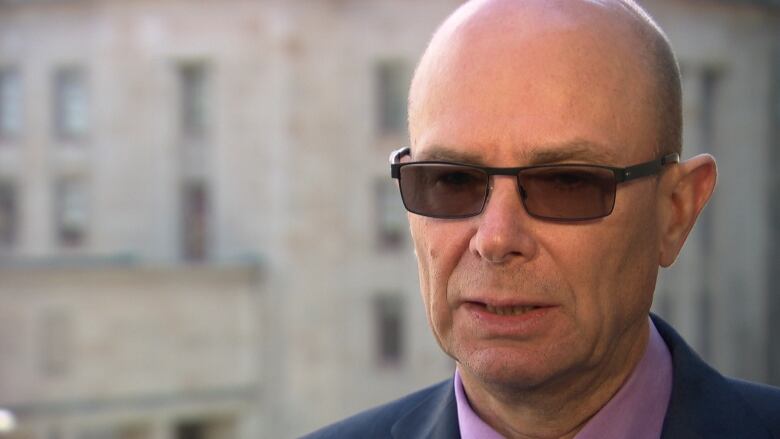PTSD a nightmare for many first responders
First responders could have greater risk of developing PTSD than soldiers in combat zones
For more than a decade, Brandon Hogan worked as a firefighter running to the rescue even though he was the one in need of rescuing.
He would charge into a blaze yet secretly wish to fall through the floor.
He was slowly breaking down mentally, suffering from post-traumatic stress disorder caused by one major incident he could not shake.
In 2005, two years after he was hired as a firefighter in Ottawa, he responded to a call involving a five-year-old boy who stopped breathing after swallowing a handful of his mother's pills.
The child thought it was candy and despite Hogan's attempts to revive him, he died. The boy was the same age as Hogan's son.
Three days later the nightmares started.
Hogan would wake up screaming in the middle of the night, drenching his sheets in sweat.
"They were close in size and the image of the boy would be on my son's face. I would get up and run into his room and put my head on his chest to see if he was breathing and I would hold him for a long time," said Hogan.
He battled nightmares and insomnia for seven years.
Hogan, 44, never told anyone because he didn't want to appear weak.
"We are in a profession where we are supposed to rescue you, nobody rescues us."
Lack of mental health services
Hogan said the only mental health advice he got came from a supervisor who pointed to a sticker on a wall advertising the phone number for the employee assistance program.
The only way he knew how to stop the panic attacks was to keep busy. On his days off, he would teach emergency rescue classes, renovate homes or pick up extra shifts.
Later, when he injured himself on a construction job, he turned to alcohol to numb the pain.
His behaviour resulted in the break-up of his marriage and the loss of access to his children.
Unable to cope, Hogan decided todrown himself in the St. Lawrence River on a September evening in 2012.
But before he could reach his destination, he fell asleep at the wheel and drove off the road.
While recovering in hospital, he was finally diagnosed with PTSD, seven years after that fateful 911 call.
Nature of work more susceptible to mental illness
Data gathered by TEMA Conter, an organization that advocates for people who work in public safety, show that since April 2014, 40 first responders have committed suicide. This number includes firefighters, paramedics and police officers.
It's like my brain is in a wheelchair.- Brandon Hogan
TEMA doesn't know how many of the 40 first responders who committed suicide were diagnosed with PTSD but Dr.Lynette Monteiro, an Ottawa psychologist, said emergency workers, by the very nature of their work, are more susceptible to the mental illness.
"The job requires constant and unrelenting exposure to traumatic events and more than that it's unpredictable," said Monteiro.
In her treatment of both soldiers and police officers struggling with PTSD, Monteiro sees parallel mental landmines between military staff and emergency workers.
Monteiro said some studies show that first responders have a greater risk of developing PTSD than Canadian soldiers in combat zones.
For example, the prevalence of PTSD in police and paramedics hovers around 20 per cent, compared to eightper cent in the Canadian military.
Call for a national PTSD strategy for first responders
"We see an epidemic of injury," said Scott Marks, of the International Association of Firefighters. "We've got first responders hurting themselves and committing suicide."
Recent suicides are driving the efforts of the IAFF in lobbying federal politicians of all stripes for a national PTSD strategy for first responders.

This can include bringing together best practices for treating PTSD and creating a national registry of doctors emergency responders can turn to.
"We've got to start treating mental injuries, like we do physical injuries," said Marks.
Rehabilitation costs rarely covered
Right now in Ontario the Workplace Safety and Insurance Board will cover the costs of lengthy rehabilitation for emergency workers who get physically injured but it is rare for WSIB to cover mental health claims.
Even after his diagnosis of PTSD following a suicide attempt, Hogan was unable to get the necessary treatment.
As a firefighter, his health insurance plan only paid the equivalent of $10 a day for psychological therapy, but the program he needed cost $200 a day. So instead he was put in an addictions program for alcoholics which didn't address the real source of his illness.
Hogan said his symptoms paralyze him.
"It's like my brain is in a wheelchair."
He can't concentrate, and has poor short-term memory. To fight off the insomnia, nightmares and depression, he needs a cocktail of drugs that puts him in a fog for half his waking day.
But just this past April, after enduring a battery of medical tests and submitting countless forms, Hogan received some good news.
After a two-year wait, WSIB approved his claim acknowledging that his PTSD was acquired on the job.
He will now be able to afford the intensive and lengthy psycho-therapy he needs.
While he's hopeful he will get better, Hogan believes his fire rescue days are over.
"It's all I ever wanted to do, now it feels like a past life."
Mental health resources in eastern Ontario
- Ottawa Distress Centre line: 613-238-3311.
- Mental Health Crisis Line:(Ages 16 and up) 613-722-6914 toll free at: 1-866-996-0991.
- Child, Youth and Family Crisis Line for Eastern Ontario: 1-877-377-7775.
- Brockvilleand counties of Leeds,GrenvilleandLanarktoll free at: 1-866-281-2911.
- Pembroke Regional Hospital Mobile Crisis Team: 613-732-3675, ext. 8116.













_(720p).jpg)


 OFFICIAL HD MUSIC VIDEO.jpg)
.jpg)



























































































